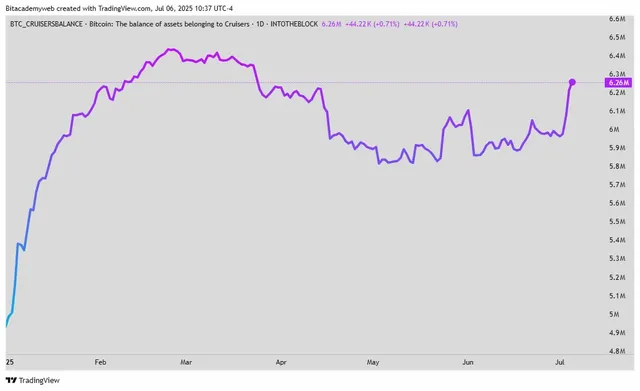Whales Accumulate Bitcoin While Retail Investors Flee
The financial elite and Bitcoin "Cruisers" are consolidating their power, challenging traders already taking profits. A silent battle is defining the future of BTC!
As Bitcoin (BTC) consolidates its position as the benchmark digital asset, a clear dichotomy is emerging in the behavior of its investors, outlining a fascinating scenario for the remainder of 2025. The big players—long-term investors and institutions—are quietly accumulating, suggesting a strong conviction in the cryptocurrency's future. In contrast, short- and medium-term investors, along with retail investors, are opting for profit-taking, generating tension in the market.

BTC whales and ETFs are accumulating Bitcoin (6.26M BTC "Cruisers", 1.40M BTC ETFs) while traders (1.42M BTC) are selling. / TradingView
The Giants' Strategy: Silent Accumulation
The most recent data from Into The Block reveals a pattern of massive accumulation by veteran investors, nicknamed "cruisers," those who keep their BTC in wallets for more than five years. So far in 2025, these "cruisers" have increased their holdings by an impressive 24.98%, reaching a staggering 6.26 million BTC. This accumulation is a testament to the long-term confidence in Bitcoin's potential as a store of value.
Meanwhile, "hodlers," those who hold their coins for three to five years, also show stability, currently holding 12.23 million BTC, a slight increase of 0.12%. This segment reinforces the idea of an investor base that is not easily fazed by market fluctuations.
The Sell-Off by Traders and Retailers
The other side of the coin is represented by "traders," who hold Bitcoin for between one and three years. This group drastically reduced their holdings by -45.37% so far in 2025, now holding 1.42 million BTC. This sharp decline suggests a wave of profit-taking, a typical behavior in bullish cycles where investors seek to capitalize on price movements. Retail investors also join this selling trend, generating short-term supply pressure.
The Institutional Pillar: Bitcoin ETFs and Macroeconomic Uncertainty
The real strength sustaining Bitcoin's current rally comes from the massive inflow of institutional capital through Bitcoin Exchange-Traded Funds (ETFs). The BTC balance in these ETFs reached an all-time high of 1.40 million BTC, demonstrating an insatiable appetite on the part of large funds and corporations.
This influx of institutional capital occurs in a context of profound global macroeconomic uncertainty, driven by several reasons:
Inflation Hedging: Given concerns about the devaluation of fiat currencies due to central banks' expansionary monetary policies, Bitcoin is seen as "digital gold," a scarce store of value with limited supply that can protect purchasing power.
Diversification and Uncorrelated Assets: Many investors view Bitcoin as an asset potentially uncorrelated with traditional markets (stocks, bonds), offering a diversification tool in portfolios seeking to reduce systemic risk.
Safe Haven from Banking Crises: Instabilities in the traditional banking system have led some investors to seek refuge in decentralized assets, perceiving Bitcoin as an alternative outside of government and banking control.
Rising Public Debt: Rising global debt is driving the search for assets that are not directly exposed to the fiscal risks of states, and Bitcoin, with its decentralized nature, is emerging as an attractive option.
Why Do Investors Choose ETFs?
The popularity of Bitcoin ETFs among investors is no coincidence. These vehicles offer several key advantages:
Accessibility and Familiarity: They allow institutional and retail investors to gain exposure to Bitcoin through their traditional brokerage accounts, eliminating the complexity of managing cryptocurrencies directly.
Security and Professional Custody: Investors are freed from concerns about the security of private keys or the risk of hacking, as the ETF issuer ensures the secure custody of the underlying assets.
Regulatory Compliance: For many regulated funds and entities, direct investment in cryptocurrencies is an obstacle. ETFs, as regulated products listed on traditional exchanges, offer a legitimate and compliant route to enter the Bitcoin space.
Liquidity and Transparency: ETFs are listed on highly liquid exchanges, making it easy to buy and sell shares. Their prices closely reflect the spot value of Bitcoin, adding transparency.
Bitcoin's Near Future
Current momentum suggests that, despite short-term profit-taking, Bitcoin's underlying uptrend is robust, driven by long-term accumulation and, crucially, by growing institutional interest channeled through ETFs. This outlook points to a market in a consolidation phase, but with strong potential for significant future upside moves as the free float shrinks and institutional demand persists.
Disclaimer: This article is for informational and journalistic purposes only. It should not be considered financial advice. Investing in cryptocurrencies carries significant risks. Please conduct your own research and consult a financial professional before making any investment decisions.
Upvoted! Thank you for supporting witness @jswit.